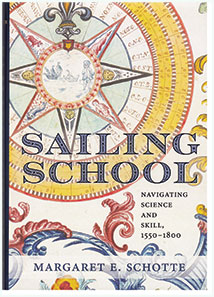Deep dive into the history of navigational training
Sailing School: navigating science and skill, 1550-1800, by Margaret E. Schotte
 When the Age of Exploration began in the 15th century, Europe was almost irrelevant compared to the thriving civilizations of China, India and the Middle East. Three hundred years later a few small countries on the far edge of Eurasia were on the way to world domination.
When the Age of Exploration began in the 15th century, Europe was almost irrelevant compared to the thriving civilizations of China, India and the Middle East. Three hundred years later a few small countries on the far edge of Eurasia were on the way to world domination.
In hindsight it's easy to assume that this remarkable change in fortune was inevitable, but – as Margaret Schotte shows in this handsome volume – the discovery of new worlds, new markets and new lands for colonisation was dependent on the traditional skills and developing science of navigators.
Who were these new experts? Trans-oceanic exploration and trade required mariners in this period to stop coast-hugging and journey out into the open ocean, which meant that their lives depended on answering a surprisingly tricky question: 'What is the ship's location and how can it reach port safely?'
Navigators who could supply an answer were a class apart from the common sailors. In return for special privileges they were required to have hands-on skills and experience, plus a deep knowledge of the theories being developed and printed across Europe.
Previous historical works on the subject have tended to focus on the training of these navigators in particular countries, but Schotte attempts something different. She 'explores the relationship between practice and print' when studying to become a navigator in Spain, England, the Netherlands and France.
This entails an examination of the learning experience in both the classroom and on the ship's deck, and it's certainly interesting to note, as the maritime sector debates the use of simulators in the present day, that people several hundred years ago were already arguing about the relative merits of theory and practice.
By the end of the book, maritime education has moved from teaching new navigational theories in small classrooms to the sons of fishermen and merchants – people already familiar with practical maritime skills – to a more familiar approach in which institutions turn landsmen into seafarers and ensure they are up to standard using government-approved curricula and examinations.
In looking at the development of navigational theory, Schotte also seeks to put navigators in their proper place as part of the scientific revolution by showing that new knowledge wasn't just handed down from above by theoreticians – it also percolated upward from these expert technicians at sea.
Schotte's work has drawn praise from scholars, and it's no wonder; she has used archives in six different countries, including previously untouched manuscripts written by the original navigators, to discover these links between navigation, the rise of printing in Europe and the creation of modern mathematics and science.
From all of this, a new picture of the navigator emerges: skilled in the traditional seafaring arts but also highly educated, and part of an international and multilingual brotherhood whose members cooperated as much as they competed.
As you might expect from the above, this is a scholarly work. It is often technical, but always readable, and will be of great interest to anyone looking for a deep dive into the subject. Early chapters are very much focused on land-based education, but the book culminates in a fascinating account of how a British lieutenant used both mathematical and practical skills to save his ship after it hit an iceberg – capturing the moment when ‘'theory becomes applied' using his own extensive notes.
The hardback edition includes attractive black-and-white and full-colour reproductions of original woodcuts, maps and tables. It's packed with navigational history, and looks fine enough to grace any seafarer's bookshelf.
Sailing School: navigating science and skill, 1550-1800
By Margaret E. Schotte
Johns Hopkins University Press, £44.50
ISBN: 978 14214 29533
Buy this book in the Nautilus Bookshop
While you're there, why not browse the rest of the titles in our unique maritime bookshop, which sells all the books reviewed on these pages.
Buy nowMore Books
The history beneath our hulls
Shipwrecks of the Solent by Richard M JonesThis slim volume of maritime history is a fascinating book to have by your side when you're crossing the busy Solent sea area.
Bicentenary books about a beloved body
One Crew, by Helen Doe, and 200 Years of Lifesaving at Sea, by MirrorpixThe RNLI celebrated its 200th anniversary on 4 March this year. To mark the occasion, two attractive new books have been published: an official history and a 'life in pictures'.
Powerful academic appraisal of life at sea
Sea-Time: an ethnographic adventure, by Helen SampsonFew people have done more than Professor Helen Sampson to raise awareness and understanding of the lives of the world's seafarers.
Health reminder for maritime men
Sailing Through Life, by Nick ArdleyThis book is a helpful reminder to those working in the male-dominated seafaring industry that going for a checkup could save your life.
